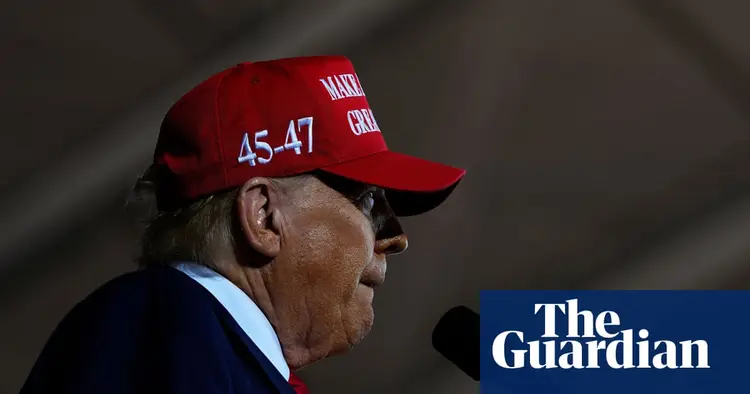Trump ground game undercut by slow internet that crashes app

Donald Trump's campaign struggles to determine if their on-the-ground efforts are effectively reaching targeted voters in key states. This is due to their reliance on software that requires a fast internet connection to accurately monitor canvassers, as reported by several sources familiar with the matter.
This time around, the Trump campaign is focusing on individuals who are likely to vote for him but don't typically participate in elections, particularly in rural regions. The strategy is based on the idea that mobilizing these potential Trump supporters, who usually avoid the polls, could sway the outcome in a tight race.
However, the Trump campaign, along with the America Pac supported by Elon Musk—which is playing a significant role in Trump's grassroots efforts—relies on a management application called Campaign Sidekick. This app faces challenges in regions with poor internet connectivity, forcing canvassers to revert to an offline version.
The Campaign Sidekick app requires canvassers with internet speeds below 40mbps—which is enough for streaming 4K videos—to rely on “offline walkbooks.” These offline versions lack geo-tracking capabilities and may not always sync data once a route is finished, according to sources.
Consequently, the Trump campaign and America Pac have limited means to verify if canvassers are genuinely visiting homes or if they are cutting corners. This could involve tactics like quickly driving by neighborhoods and tossing campaign materials at the doors instead of properly engaging with voters.
America Pac has attempted to prevent cheating by deploying teams of auditors to monitor canvassers, but it’s impossible to directly check every offline walkbook. This challenge is especially significant due to the Trump campaign’s emphasis on reaching voters who are less likely to participate.
Even when canvassers properly finish their route without an internet connection, there have been instances where their data doesn't get uploaded later, according to sources. Because canvassers are paid for each door they knock on, they end up having to redo their efforts, which not only wastes time but might also irritate voters if they have to be approached again.
"Perhaps Elon Musk could provide his canvassers with a Starlink," joked a political strategist connected to the America Pac initiative, mentioning Musk's satellite internet service.
According to sources, the Trump campaign has been receiving feedback about Sidekick for a while now. Additionally, at least two other super PACs that are helping the Trump campaign with grassroots efforts in key states have decided to cease using it for their activities.
The broader concerns involve the app crashing during busy times when it's being used by a lot of people simultaneously. There are also technical issues, such as the malfunctioning Google Maps preview within the app, which helps canvassers plan their routes.
Campaign Sidekick has responded to the criticism by stating that it has always been clear about the shortcomings of offline walkbooks. They also advise their clients to monitor certain indicators of potential fraud, such as canvassers reporting that they spoke with voters at more than 25% of the doors they visited.
An executive from September Group LLC, a prominent canvassing company that worked with America Pac on door-to-door outreach in Arizona and Nevada until last month, expressed satisfaction with Sidekick. They mentioned that, despite choosing not to use traditional offline walkbooks due to their limitations, they still appreciated the benefits of Sidekick.
Chris LaCivita, co-campaign chief for the Trump campaign, brushed off the grievances, stating, "Our canvassing applications are functioning well, and we've made significant investments in cutting-edge technology this cycle that stands out in the political arena to enhance our initiatives. This is clearly an attack from a vendor that didn't succeed, and we will definitely name and expose them once we complete our victory in this campaign."
LaCivita didn't explain why they are focusing their doubts on a vendor, especially since most complaints have actually come from their own on-the-ground partners. Additionally, the statement overlooked mentioning that the campaign has known about these problems for a while now.
Other groups have also voiced concerns about Campaign Sidekick. Turning Point Action, led by conservative activist Charlie Kirk, informed the Trump campaign that they faced numerous challenges with the app. As a result, they decided to rely on their own application in Arizona, Wisconsin, and certain areas of Michigan.
Turning Point's main issue has been the need to handle everything by hand. They expressed frustration that if a canvasser was only able to cover a portion of their assigned door-knocking route, there was no system in place to automatically reassign the leftover doors to another canvasser. As a result, those voters would end up being missed entirely.
It's not entirely obvious why the Trump campaign has decided to continue using the software, other than a desire for consistency.
In March, the Trump campaign assumed control of the Republican National Committee and instructed America Pac to utilize the app. This decision was partly because the Trump team was already using the app, and they believed that having all the data come through a single system would make analysis simpler, according to a Trump official.
There have also been political factors at play. The Trump campaign chose not to utilize other platforms like i360 Walk, in part because of a lack of trust in its owners, the Koch brothers, who have been opponents of Trump in the past, according to a source.
The Trump campaign opted not to utilize software from Advantage Inc, considering it subpar. Additionally, they avoided it because Florida Governor Ron DeSantis had used that platform for his voter outreach efforts during his 2024 Republican primary campaign against Trump.
The Numinar platform, which America First Works is using—a PAC aligned with Trump that focuses on grassroots efforts—did not catch on with the Republican National Committee. It's still uncertain why, given that it was proposed as an alternative to Campaign Sidekick earlier in this election cycle.









































